关于大学是否开放校园旅游英语作文.pdf
大学校园是否对外开放英语作文
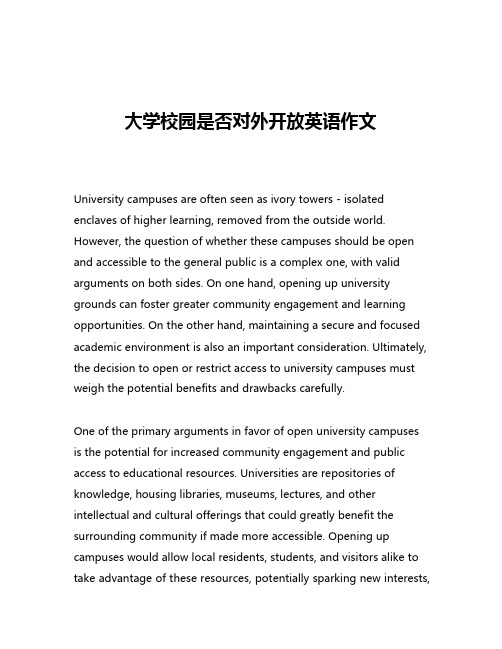
大学校园是否对外开放英语作文University campuses are often seen as ivory towers - isolated enclaves of higher learning, removed from the outside world. However, the question of whether these campuses should be open and accessible to the general public is a complex one, with valid arguments on both sides. On one hand, opening up university grounds can foster greater community engagement and learning opportunities. On the other hand, maintaining a secure and focused academic environment is also an important consideration. Ultimately, the decision to open or restrict access to university campuses must weigh the potential benefits and drawbacks carefully.One of the primary arguments in favor of open university campuses is the potential for increased community engagement and public access to educational resources. Universities are repositories of knowledge, housing libraries, museums, lectures, and other intellectual and cultural offerings that could greatly benefit the surrounding community if made more accessible. Opening up campuses would allow local residents, students, and visitors alike to take advantage of these resources, potentially sparking new interests,collaborations, and learning opportunities. This could be particularly impactful in underserved communities where access to such enrichment may be limited.Moreover, greater public access to university grounds can foster a sense of shared ownership and investment in the institution. When community members feel welcome on campus and able to participate in its activities, they are more likely to develop a vested interest in the university's success and growth. This can manifest in increased volunteerism, philanthropic support, and advocacy for the institution - all of which are invaluable to the long-term sustainability of a university.Additionally, open campuses can serve as hubs of community engagement, hosting events, workshops, and outreach programs that bring together diverse groups and perspectives. This cross-pollination of ideas and experiences can lead to innovative solutions to local and global challenges, leveraging the intellectual capital of the university in service of the greater good. By positioning the campus as a public resource, universities have the opportunity to fulfill their role as engines of social progress and community development.On the other hand, proponents of restricted campus access argue that maintaining a secure and focused academic environment iscrucial for the university's primary mission of education and research. Unfettered public access can introduce safety and liability concerns, as well as disrupt the delicate ecosystem of scholarly pursuits. University campuses are designed to foster deep concentration, collaboration, and intellectual discourse - elements that can be compromised by the presence of large numbers of visitors unfamiliar with campus norms and expectations.There are also practical considerations around resource allocation and infrastructure maintenance. Catering to the needs of the general public, in addition to the university's own students and staff, can strain budgets, facilities, and personnel. Universities must carefully balance the allocation of funds, staffing, and physical space to ensure that the core academic functions are not compromised by the demands of public access.Moreover, the issue of campus security and liability is a significant concern. Universities have a duty of care to protect their students, faculty, and staff, and the presence of unaffiliated visitors can introduce unpredictable risks. Incidents of crime, vandalism, or disruption could jeopardize the safety and well-being of the campus community, potentially leading to costly legal and reputational consequences for the institution.Ultimately, the decision to open or restrict university campuses tothe public must be made on a case-by-case basis, taking into account the unique characteristics, resources, and priorities of each institution. Some universities may choose to adopt a balanced approach, selectively opening certain areas or facilities to the public while maintaining secure access to core academic spaces. Others may opt for a more restrictive model, focusing their resources on serving their own students and staff.Regardless of the approach, it is clear that the debate over open versus closed university campuses is a complex one, with valid arguments on both sides. As institutions of higher learning, universities have a responsibility to serve the broader community while also upholding their primary mission of education and research. Finding the right balance between these competing priorities is an ongoing challenge, but one that is essential for universities to navigate in order to fulfill their role as engines of knowledge, innovation, and social progress.。
大学是否应该开放旅游英语作文
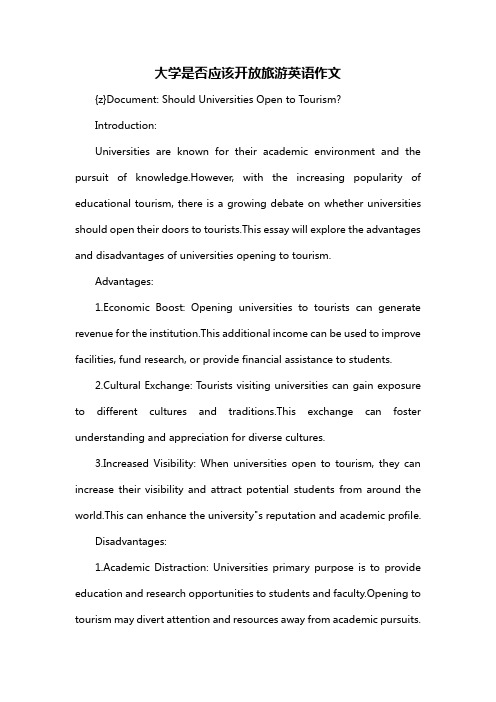
大学是否应该开放旅游英语作文{z}Document: Should Universities Open to Tourism?Introduction:Universities are known for their academic environment and the pursuit of knowledge.However, with the increasing popularity of educational tourism, there is a growing debate on whether universities should open their doors to tourists.This essay will explore the advantages and disadvantages of universities opening to tourism.Advantages:1.Economic Boost: Opening universities to tourists can generate revenue for the institution.This additional income can be used to improve facilities, fund research, or provide financial assistance to students.2.Cultural Exchange: Tourists visiting universities can gain exposure to different cultures and traditions.This exchange can foster understanding and appreciation for diverse cultures.3.Increased Visibility: When universities open to tourism, they can increase their visibility and attract potential students from around the world.This can enhance the university"s reputation and academic profile.Disadvantages:1.Academic Distraction: Universities primary purpose is to provide education and research opportunities to students and faculty.Opening to tourism may divert attention and resources away from academic pursuits.2.Privacy Concerns: Universities are private institutions that require a certain level of privacy for students and faculty.Opening to tourists may invade the privacy of the university community.3.Infrastructure Strain: Tourists can put a strain on the university"s infrastructure, such as libraries, laboratories, and recreational facilities.This strain can negatively impact the quality of education and research.Conclusion:In conclusion, there are both advantages and disadvantages to universities opening to tourism.While it can generate revenue, promote cultural exchange, and increase visibility, it can also distract from academic pursuits, invade privacy, and strain infrastructure.Universities should carefully consider these factors and develop a balanced approach to opening to tourism that does not compromise their primary mission of providing quality education and research opportunities.。
大学校园该不该对游客开放英语作文

大学校园该不该对游客开放英语作文全文共3篇示例,供读者参考篇1Should University Campus be Open to Visitors?As more and more tourists visit universities, there has been some debate over whether university campuses should be open to visitors. Some people argue that universities should be open to the public in order to promote transparency and collaboration between academic institutions and the wider community. On the other hand, some believe that universities should be restricted to students, faculty, and staff in order to maintain a sense of privacy and security on campus.One argument in favor of opening university campuses to visitors is that it promotes transparency and communication between universities and the public. By allowing visitors to tour the campus, attend lectures, and participate in events, universities can foster a sense of community and engagement with the wider public. This can help build relationships with alumni, donors, and potential students, as well as showcase the research and work being done on campus.Furthermore, opening university campuses to visitors can help universities raise funds and generate revenue. Many universities rely on donations and funding from alumni, industry partners, and government agencies to support their research and educational programs. By welcoming visitors to campus, universities can showcase their work and attract potential donors and sponsors to support their initiatives.On the other hand, some people argue that allowing visitors on campus can pose security risks and disrupt the academic environment. Universities are often busy and crowded places, with students and faculty rushing to classes, meetings, and research projects. Allowing tourists to roam freely on campus can create congestion and confusion, making it difficult for students and faculty to focus on their work.Moreover, opening university campuses to visitors can lead to privacy concerns, especially for students and researchers who may be working on sensitive projects. Allowing strangers to wander around campus can compromise the safety and security of students and faculty, as well as the integrity of research and academic work being conducted on campus.In conclusion, the question of whether university campuses should be open to visitors is a complex and nuanced issue. Whilethere are valid arguments on both sides of the debate, it is important for universities to carefully consider the impact of opening their campuses to the public. By balancing the benefits of transparency and community engagement with the need for privacy and security, universities can find a middle ground that allows them to showcase their work while protecting their students and faculty. Ultimately, the decision of whether to open university campuses to visitors should be made on acase-by-case basis, taking into account the unique needs and challenges of each institution.篇2Should College Campuses Be Open to Visitors?IntroductionCollege campuses are often seen as closed-off communities, only accessible to students, faculty, and staff. However, there is an ongoing debate about whether or not college campuses should be open to visitors. On one hand, allowing visitors onto campus can increase community engagement and promote a sense of openness and inclusivity. On the other hand, concerns about safety, security, and privacy have led some colleges torestrict access to their campuses. In this essay, we will explore the arguments for and against opening college campuses to visitors.Arguments for Opening College Campuses to Visitors1. Community EngagementOpening college campuses to visitors can promote community engagement and foster relationships between the college and the local community. Visitors can attend events, lectures, and performances on campus, which can help strengthen ties between the college and the community.2. Recruitment and Public RelationsAllowing visitors onto campus can also be beneficial for recruitment and public relations. Prospective students and their families often visit college campuses before making a decision about where to attend. By opening their campuses to visitors, colleges can showcase their facilities, academic programs, and campus culture, which can help attract and retain students.3. Educational OpportunitiesVisitors can also provide educational opportunities for students and faculty. Guest lecturers, industry professionals, and experts in various fields can enrich the academic experience by sharing their knowledge and expertise with the collegecommunity. Opening campuses to visitors can create a collaborative and dynamic learning environment.Arguments Against Opening College Campuses to Visitors1. Safety and SecurityOne of the primary concerns about opening college campuses to visitors is safety and security. Colleges must prioritize the safety of their students, faculty, and staff, and allowing unrestricted access to campus can pose risks. Visitors may not be subject to the same background checks and security measures as students and employees, which can create vulnerabilities.2. PrivacyOpening college campuses to visitors can also raise concerns about privacy. Students and faculty may feel uncomfortable with strangers roaming around campus, especially in sensitive areas such as dormitories, research labs, and offices. Maintaining a sense of privacy and confidentiality is important for thewell-being of the college community.3. DisruptionAllowing visitors onto campus can also lead to disruptions in the academic environment. Noise, crowds, and distractions caninterfere with classes, research, and other activities. Colleges must balance the benefits of opening their campuses to visitors with the potential disruptions that may arise.ConclusionIn conclusion, the question of whether college campuses should be open to visitors is a complex and multifaceted issue. While opening campuses to visitors can promote community engagement, recruitment, and educational opportunities, concerns about safety, security, and privacy must also be taken into account. Colleges must carefully consider the implications of allowing visitors onto their campuses and develop policies and procedures to ensure the safety and well-being of their students, faculty, and staff. Ultimately, finding a balance between openness and security is essential in creating a welcoming and inclusive campus environment.篇3Should University Campuses be Opened to Visitors?University campuses are often seen as closed-off spaces, reserved only for students, faculty, and staff. However, there has been a growing debate about whether or not universities should open their campuses to visitors. Some argue that openingcampuses to the public can promote a sense of community and foster relationships with the broader society. Others believe that keeping campuses closed is necessary to maintain security and privacy.There are several reasons why university campuses should be open to visitors. First and foremost, opening campuses can create a more vibrant and inclusive environment. By welcoming visitors, universities can showcase their facilities, academic programs, and research initiatives to a wider audience. This can help attract prospective students, donors, and collaborators, as well as strengthen ties with the local community. Additionally, allowing visitors on campus can promote cultural exchange and understanding, as people from different backgrounds come together to learn and engage with one another.Moreover, opening campuses to visitors can have economic benefits. Visitors, such as parents, alumni, and prospective students, often spend money on campus tours, merchandise, and dining options. This can provide universities with an additional source of revenue, which can be reinvested into campus improvements or academic programs. Furthermore, hosting conferences, workshops, and events on campus can helpstimulate the local economy and support small businesses in the area.On the other hand, there are valid concerns about opening university campuses to visitors. One of the main arguments against doing so is the issue of security. Allowing unrestricted access to campus facilities can pose a risk to the safety of students, faculty, and staff. Visitors may not be subject to the same background checks and security protocols as members of the university community, which could potentially lead to incidents of theft, vandalism, or violence. In order to mitigate these risks, universities would need to implement tighter security measures, such as visitor registration, identification checks, and surveillance cameras.Privacy is another important consideration when it comes to opening university campuses to visitors. Students and faculty may have sensitive information, research projects, or personal belongings on campus that they do not want to be exposed to the public. Allowing strangers to roam freely around campus could compromise the privacy and confidentiality of individuals, leading to potential breaches of academic integrity or personal safety. As a result, universities must strike a balance between openness and protection of their members' rights.In conclusion, the question of whether or not to open university campuses to visitors is a complex one that requires careful consideration of the benefits and drawbacks. While there are compelling arguments in favor of opening campuses, such as promoting community engagement and economic development, there are also legitimate concerns about security and privacy. Ultimately, universities must weigh these factors and make informed decisions that align with their mission and values. By finding the right balance between openness and protection, universities can create a welcoming and safe environment for all members of their community.。
校园是否应多游客开放英语作文

校园是否应多游客开放英语作文Should Campuses Be Open to More Tourists?In recent years, there has been a growing trend of opening campuses to tourists. Some argue that this can bring various benefits to both the universities and the visitors, while others believe that it may have negative consequences. In this article, we will explore the pros and cons of opening campuses to more tourists and discuss whether it is a good idea.On one hand, opening campuses to tourists can provide financial benefits to universities. By charging entrance fees or offering guided tours, universities can generate additional revenue that can be used to improve facilities, support research, and enhance the overall educational experience for students. This extra income can also help universities offer more scholarships and financial aid to students who need it the most.Furthermore, allowing tourists to visit campuses can promote cultural exchange and understanding. Visitors from different backgrounds and countries can learn about the university's history, traditions, and academic achievements. This can foster a sense of global citizenship and promote diversity on campus. Additionally, tourists can interact with students and faculty, leading to valuable cross-cultural experiences and the exchange of ideas.Moreover, opening campuses to tourists can help universities showcase their academic programs and attract potential students. By allowing visitors to see the campus firsthand, universities can create a positive impression and demonstrate their commitment to excellence. This can be particularly beneficial for international students who may not have the opportunity to visit the campus before making a decision. It can also serve as a marketing tool, as satisfied tourists may recommend the university to others.On the other hand, there are concerns that opening campuses to tourists may disrupt the learning environment. Increased foot traffic and noise from tourists can be distracting for students and faculty, making it difficult to concentrate in classrooms and study areas.Moreover, the presence of tourists may limit students' access to certain facilities, such as libraries or laboratories, as these spaces may need to be reserved for visitors. This can negatively impact students' academic experience and hinder their ability to fully utilize the resources available to them.Additionally, there is a risk of vandalism or theft when campuses are open to the public. Visitors who are not affiliated with the university may not have the same respect for the campus and its property. This can result in damage to buildings, theft of equipment, or defacement of campus landmarks. Universities would need to invest in additional security measures to mitigate these risks, which can be costly and time-consuming.Furthermore, the influx of tourists may create congestion and overcrowding on campus. This can lead to logistical challenges, such as limited parking spaces and longer lines at campus facilities. Students may also feel like they are constantly being observed or that their privacy is being invaded. This can create a sense of discomfort and hinder their ability to fully engage in campus life.In conclusion, the question of whether campuses should be open to more tourists is a complex one. While there are potential benefits, such as financial gains, cultural exchange, and increased visibility, there are also drawbacks, including disruptions to the learning environment and potential security risks. Ultimately, universities must carefully consider the impact on students and the overall educational mission before deciding to open their campuses to tourists.。
大学校园是否应该对游客开放英语作文 要求
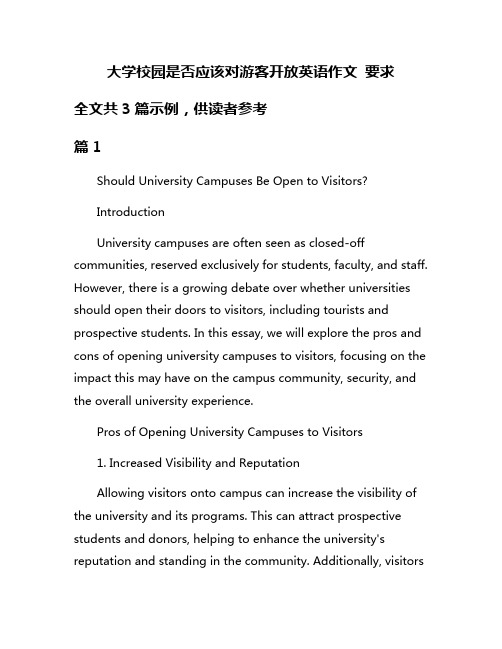
大学校园是否应该对游客开放英语作文要求全文共3篇示例,供读者参考篇1Should University Campuses Be Open to Visitors?IntroductionUniversity campuses are often seen as closed-off communities, reserved exclusively for students, faculty, and staff. However, there is a growing debate over whether universities should open their doors to visitors, including tourists and prospective students. In this essay, we will explore the pros and cons of opening university campuses to visitors, focusing on the impact this may have on the campus community, security, and the overall university experience.Pros of Opening University Campuses to Visitors1. Increased Visibility and ReputationAllowing visitors onto campus can increase the visibility of the university and its programs. This can attract prospective students and donors, helping to enhance the university's reputation and standing in the community. Additionally, visitorsmay spread the word about their positive experiences on campus, further enhancing the university's reputation.2. Educational OpportunitiesOpening university campuses to visitors can provide educational opportunities for the general public. Visitors may attend lectures, workshops, or other events, allowing them to learn more about a particular subject or field of study. This can help to promote lifelong learning and engage the community in the university's academic mission.3. Economic BenefitsVisitors to university campuses may spend money on campus tours, merchandise, and dining options, providing a source of revenue for the university. Additionally, local businesses near campus may benefit from an increase in foot traffic, further stimulating the local economy.Cons of Opening University Campuses to Visitors1. Disruption to the Campus CommunityOpening university campuses to visitors may disrupt the daily life of students, faculty, and staff. Increased foot traffic and noise can make it more difficult for members of the campus community to focus on their studies or work. Additionally,visitors may not always respect campus policies or rules, leading to conflicts with university officials.2. Security ConcernsAllowing visitors onto campus can raise security concerns, as it may be more difficult to monitor who is entering the university grounds. This can pose a risk to the safety of students, faculty, and staff, as well as the security of university property. Without proper security measures in place, opening university campuses to visitors may put the entire campus community at risk.3. Impact on the University ExperienceVisitors may alter the atmosphere of the university campus, leading to a loss of the sense of community that many students value. Additionally, the presence of visitors may make it more difficult for students to find quiet study spaces or access resources on campus. This can have a negative impact on the overall university experience for students, faculty, and staff.ConclusionIn conclusion, the decision to open university campuses to visitors is a complex one that requires careful consideration of the potential benefits and drawbacks. While allowing visitors onto campus can increase visibility, provide educationalopportunities, and stimulate the local economy, it may also disrupt the campus community, raise security concerns, and impact the university experience for students, faculty, and staff. Ultimately, universities must strike a balance between openness and security to ensure the safety and well-being of the campus community while also maximizing the benefits of engaging with visitors.篇2Should College Campuses Be Open to Visitors?IntroductionCollege campuses are often seen as closed-off communities, only accessible to students, faculty, and staff. However, there is an ongoing debate about whether campuses should be open to visitors, especially tourists. In this essay, we will explore the pros and cons of allowing visitors onto college campuses and ultimately, consider whether colleges should open their doors to the public.Benefits of Allowing Visitors1. Cultural ExchangeBy allowing visitors onto college campuses, colleges can promote cultural exchange and broaden students’ perspectives. Visitors from different countries and backgrounds can bring new ideas and experiences to the campus, enriching the learning environment for students.2. Potential RevenueOpening college campuses to visitors could also generate revenue for the institution. Visitors may be willing to pay for guided tours, events, or merchandise, providing colleges with an additional source of income.3. Community EngagementAllowing visitors onto college campuses can help colleges build stronger ties with the local community. By hosting events and open days for the public, colleges can improve their reputation and foster positive relationships with local residents.Drawbacks of Allowing Visitors1. Disruption to Campus LifeOne of the main concerns about opening college campuses to visitors is the potential disruption to campus life. Tourists wandering around campus, attending classes, or using facilitiescould disturb students and faculty, affecting their learning and work environment.2. Safety and Security RisksOpening college campuses to visitors could also pose safety and security risks. Without proper vetting and monitoring, visitors may pose a threat to the campus community, leading to incidents of theft, vandalism, or even violence.3. Privacy ConcernsAllowing visitors onto college campuses may also raise privacy concerns for students and faculty. Visitors could take photos, record videos, or share sensitive information about the campus community on social media, compromising individuals’ privacy and safety.ConclusionIn conclusion, the question of whether college campuses should be open to visitors is a complex issue with both benefits and drawbacks. While allowing visitors can promote cultural exchange, generate revenue, and engage the community, it may also disrupt campus life, pose safety risks, and raise privacy concerns. Ultimately, colleges must carefully weigh these factors and consider implementing policies and regulations to ensurethat opening their doors to visitors benefits the campus community as a whole.篇3Should University Campuses Be Open to Visitors?As university campuses are considered hubs of intellectual activity and innovation, the question of whether they should be open to visitors is a topic of debate. Some argue that opening up campuses to visitors can foster a sense of community and collaboration, while others believe that it can compromise the safety and privacy of students and staff. In this essay, I will examine both sides of the argument and provide my perspective on the matter.Those in favor of opening university campuses to visitors argue that it can promote a more inclusive and welcoming environment. Visitors, such as prospective students, parents, alumni, and members of the local community, can gain insight into the institution's culture, values, and academic programs. This can help build stronger ties between the university and the surrounding community, leading to an exchange of ideas and resources.Furthermore, opening campuses to visitors can enhance the university's reputation and attract potential students and donors. By showcasing the campus facilities, research projects, and student achievements, universities can demonstrate their commitment to excellence and innovation. This can be beneficial for recruitment efforts, as prospective students may be more likely to choose a university with a vibrant and engaging campus environment.On the other hand, opponents of opening university campuses to visitors raise concerns about security and privacy. Universities are responsible for ensuring the safety andwell-being of their students and staff, and allowing unrestricted access to outsiders can pose risks. Visitors may disrupt classes, invade private spaces, or engage in inappropriate behavior, leading to potential safety and security concerns.Moreover, opening campuses to visitors can also raise issues of privacy for students and staff. With the increasing use of surveillance technology on campus, such as security cameras and access control systems, allowing visitors to roam freely can compromise the privacy of individuals. Students may feel uncomfortable having strangers on campus, especially if they are trying to study, relax, or socialize in private spaces.In my opinion, there is a need to strike a balance between opening university campuses to visitors and ensuring the safety and privacy of students and staff. One way to achieve this is by implementing visitor guidelines and restrictions, such as designated visiting hours, visitor registration, and escort services. By establishing clear guidelines and expectations for visitors, universities can maintain a welcoming environment while upholding security and privacy standards.Additionally, universities can leverage technology to enhance the visitor experience and streamline access control. For example, universities can develop virtual campus tours, interactive maps, and online registration platforms to provide visitors with a more convenient and informative visit. This can help reduce physical foot traffic on campus and mitigate potential security risks associated with large crowds.In conclusion, the question of whether university campuses should be open to visitors is a complex issue that requires careful consideration and planning. While there are benefits to opening campuses to visitors, such as promoting community engagement and recruitment, it is important to prioritize the safety and privacy of students and staff. By implementing visitor guidelines, leveraging technology, and fostering a culture ofrespect and responsibility, universities can create a welcoming and secure environment for visitors while upholding their core values and mission.。
大学校园应该对游客开放吗英语作文
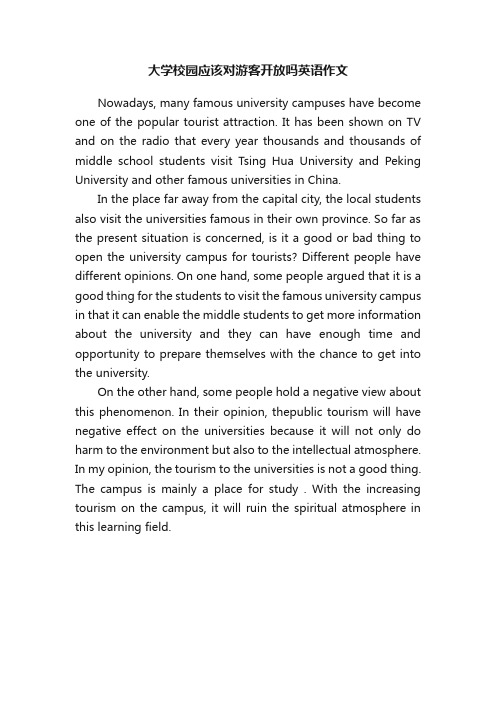
大学校园应该对游客开放吗英语作文Nowadays, many famous university campuses have become one of the popular tourist attraction. It has been shown on TV and on the radio that every year thousands and thousands of middle school students visit Tsing Hua University and Peking University and other famous universities in China.In the place far away from the capital city, the local students also visit the universities famous in their own province. So far as the present situation is concerned, is it a good or bad thing to open the university campus for tourists? Different people have different opinions. On one hand, some people argued that it is a good thing for the students to visit the famous university campus in that it can enable the middle students to get more information about the university and they can have enough time and opportunity to prepare themselves with the chance to get into the university.On the other hand, some people hold a negative view about this phenomenon. In their opinion, thepublic tourism will have negative effect on the universities because it will not only do harm to the environment but also to the intellectual atmosphere. In my opinion, the tourism to the universities is not a good thing. The campus is mainly a place for study . With the increasing tourism on the campus, it will ruin the spiritual atmosphere in this learning field.。
校园是应该对游客开放英语作文

Campus Accessibility to Tourists: ANecessary DebateIn recent years, the question of whether campusesshould be open to tourists has garnered significant attention. This debate is not without merit, as it raises important considerations about the role of universities in society, the safety of students and faculty, and the potential benefits and drawbacks of increased public access. **Arguments for Campus Accessibility**Firstly, opening campuses to tourists promotes cultural exchange and understanding. Universities are repositoriesof knowledge and culture, and by allowing visitors to explore their facilities and spaces, they can gain a deeper understanding of the academic and social life of students. This can foster a greater appreciation for the value of education and research, and contribute to the creation of a more informed and engaged citizenry.Secondly, campus tourism can bring economic benefits to universities and surrounding communities. Tourism generates revenue through ticket sales, increased spending in localbusinesses, and the creation of jobs. Universities can leverage their unique resources and attractions to attract visitors, who in turn become ambassadors for theinstitution and its community, drawing even more attention and support.Lastly, campus accessibility can foster a sense of community and pride among students and faculty. When university campuses are open to the public, they become extensions of the local community, inviting neighbors and visitors to share in their academic and cultural pursuits. This can enhance the sense of belonging and community engagement among students and faculty, who feel more connected to their institution and its role in society.**Arguments Against Campus Accessibility**However, there are also valid arguments against opening campuses to tourists. Firstly, the safety of students and faculty must be paramount. With increased public access, there is a potential for increased crime and security issues. Universities must ensure that their campuses are well-monitored and secured, and that any potential risks to the safety of their community are mitigated.Secondly, campus tourism can disrupt the academic and research environment. Large numbers of visitors can create noise and congestion, interrupting classes, lab work, and other academic activities. Universities must carefully manage the flow of visitors to ensure that they do not interfere with the normal operations of the institution. Lastly, there are concerns about the potential for damage to campus facilities and resources. With increased foot traffic and use of university facilities, there is a greater risk of wear and tear, vandalism, and even theft. Universities must invest in additional resources to maintain their facilities and ensure that they are protected from any potential harm.**Conclusion**The debate over whether campuses should be open to tourists is complex and multifaceted. While there are significant benefits to increased public access, including cultural exchange, economic benefits, and community engagement, there are also important considerations about safety, academic disruption, and resource protection. Universities must carefully consider these factors whendeciding whether to open their campuses to tourists, and ensure that any decisions are made with the best interests of their community and mission in mind.**校园对游客开放:一场必要的辩论**近年来,关于校园是否应对游客开放的问题引起了广泛关注。
学校是否应该对游客开放英语作

学校是否应该对游客开放英语作文【英语作文】nowadays, there has been a heated discussion (a sensational debate) on the issue of sth. on whether or not we should …people who prefer to treat college as destination of tourists have their reasons: the first reason for their choice is, they maintain, that (this will provide university an etra sum of money, will can help solve the university financial problem). besides, this practice, they go on to point out, can help college students have contact with the outside world. what is more important,. they also claim that colleges can be soils for teenage tourists to cultivate their love for knowledge and truth.but others may not agree. they would argue that this will inevitably distract college students from their study;what is worse, they emphasize, tourists might leave some rubbish on the campus, which will ruin the beauty of campus.who is right? of course both sides have their reasons. were i to offer my choice, i would not hesitate a moment to say that i favor (the former side. after all, colleges and universities are public places as long as tourists take care not to cause trouble for colleges.。
大学校园是否对游客开放英语作文120字
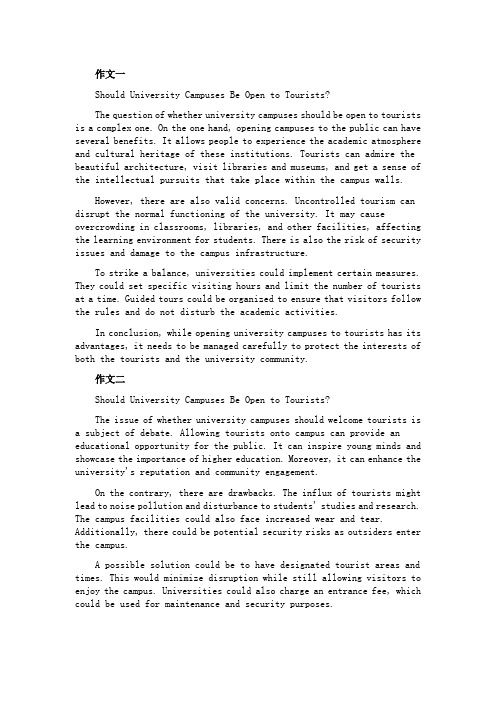
作文一Should University Campuses Be Open to Tourists?The question of whether university campuses should be open to tourists is a complex one. On the one hand, opening campuses to the public can have several benefits. It allows people to experience the academic atmosphere and cultural heritage of these institutions. Tourists can admire the beautiful architecture, visit libraries and museums, and get a sense of the intellectual pursuits that take place within the campus walls.However, there are also valid concerns. Uncontrolled tourism can disrupt the normal functioning of the university. It may cause overcrowding in classrooms, libraries, and other facilities, affecting the learning environment for students. There is also the risk of security issues and damage to the campus infrastructure.To strike a balance, universities could implement certain measures. They could set specific visiting hours and limit the number of tourists at a time. Guided tours could be organized to ensure that visitors follow the rules and do not disturb the academic activities.In conclusion, while opening university campuses to tourists has its advantages, it needs to be managed carefully to protect the interests of both the tourists and the university community.作文二Should University Campuses Be Open to Tourists?The issue of whether university campuses should welcome tourists is a subject of debate. Allowing tourists onto campus can provide an educational opportunity for the public. It can inspire young minds and showcase the importance of higher education. Moreover, it can enhance the university's reputation and community engagement.On the contrary, there are drawbacks. The influx of tourists might lead to noise pollution and disturbance to students' studies and research. The campus facilities could also face increased wear and tear. Additionally, there could be potential security risks as outsiders enter the campus.A possible solution could be to have designated tourist areas and times. This would minimize disruption while still allowing visitors to enjoy the campus. Universities could also charge an entrance fee, which could be used for maintenance and security purposes.In summary, the decision to open university campuses to tourists should be made after carefully considering the pros and cons and implementing appropriate measures to ensure a harmonious coexistence.作文三Should University Campuses Be Open to Tourists?The question of whether to open university campuses to tourists is not straightforward. One advantage of opening is that it can promote cultural exchange. Tourists can interact with students and faculty, learning about different academic disciplines and cultural backgrounds. This can foster a more inclusive and diverse society.However, there are significant challenges. Heavy tourist traffic can create chaos and affect the daily routine of the campus. Students might find it difficult to concentrate in a crowded and noisy environment. Also, the privacy of the campus community could be compromised.To address these concerns, universities could implement a reservation system. This would control the number of visitors and ensure a more orderly experience. Moreover, clear guidelines and rules could be established to regulate tourist behavior.In conclusion, while opening university campuses to tourists has potential benefits, it requires careful management and regulation to protect the academic integrity and quality of life on campus.**作文四】Should University Campuses Be Open to Tourists?The debate over the openness of university campuses to tourists is a significant one. When campuses are accessible to tourists, it can enhance the university's image and contribute to local tourism. It gives outsiders a glimpse into the academic world and can potentially inspire future students.On the flip side, it can pose several problems. The campus might become too crowded, especially during peak tourist seasons. This could lead to a shortage of resources for students and faculty. Moreover, there could be an increased risk of vandalism and littering.To mitigate these issues, universities could consider implementing restricted access areas for tourists. They could also collaborate with local tourism agencies to manage the flow of visitors effectively.In summary, while opening university campuses to tourists can have positive aspects, it is crucial to find a balance that protects the campus environment and the educational process.作文五Should University Campuses Be Open to Tourists?The topic of whether university campuses should be open to tourists has both supporters and opponents. Opening up can be beneficial as it can generate revenue for the university. This money can be used for improving facilities and providing better resources for students.However, there are downsides. The presence of tourists can disrupt academic activities. Lectures and study sessions might be disturbed by the noise and commotion. There is also a potential for conflicts between tourists and the campus community over the use of common spaces.To handle this, universities could establish separate visiting routes and times. They could also provide educational materials or guided tours to ensure that tourists gain meaningful insights without causing disruptions.In conclusion, the decision to open university campuses to tourists should be based on a careful assessment of the potential impacts and the implementation of effective management strategies.作文六Should University Campuses Be Open to Tourists?The question of whether to allow tourists on university campuses is a complex one. If campuses are open, it offers an opportunity for the public to appreciate the beauty and intellectual environment of these institutions. It can also foster a sense of community and shared knowledge.Conversely, there are concerns. Uncontrolled tourism can lead to overcrowding, affecting the quality of life for students and staff. There could be issues related to safety and the protection of sensitive research areas.To find a middle ground, universities might consider having specific days or times for tourist visits. They could also require tourists to register in advance and follow strict guidelines.In summary, while opening university campuses to tourists has its merits, it needs to be done in a way that respects the academic mission and the needs of the campus community.。
校园是否应该对游客开放英语作文优秀范文
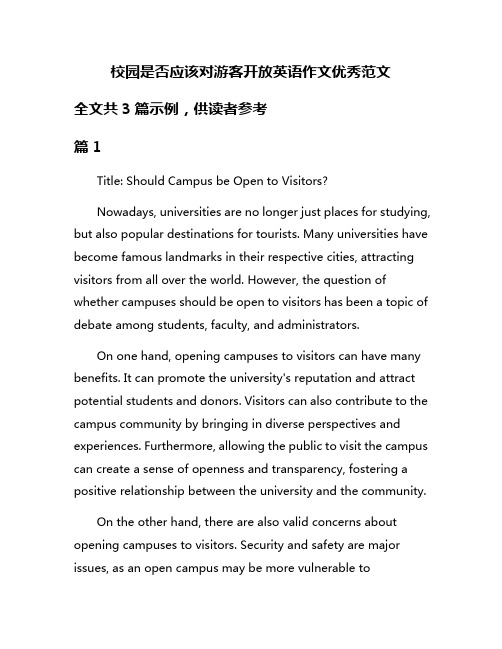
校园是否应该对游客开放英语作文优秀范文全文共3篇示例,供读者参考篇1Title: Should Campus be Open to Visitors?Nowadays, universities are no longer just places for studying, but also popular destinations for tourists. Many universities have become famous landmarks in their respective cities, attracting visitors from all over the world. However, the question of whether campuses should be open to visitors has been a topic of debate among students, faculty, and administrators.On one hand, opening campuses to visitors can have many benefits. It can promote the university's reputation and attract potential students and donors. Visitors can also contribute to the campus community by bringing in diverse perspectives and experiences. Furthermore, allowing the public to visit the campus can create a sense of openness and transparency, fostering a positive relationship between the university and the community.On the other hand, there are also valid concerns about opening campuses to visitors. Security and safety are major issues, as an open campus may be more vulnerable tounauthorized access and potential threats. Visitors may also disrupt the academic environment, such as by being noisy or disrespectful of campus rules. Moreover, some argue that universities should prioritize the needs and privacy of their students and faculty over catering to tourists.In my opinion, campuses should be open to visitors, but with certain limitations and guidelines in place. It is important to strike a balance between promoting the university and ensuring the safety and well-being of the campus community. Universities can implement measures such as requiring visitors to register at the entrance, providing guided tours, and restricting access to certain areas on campus. By doing so, universities can benefit from the positive aspects of tourism while mitigating the potential drawbacks.In conclusion, the question of whether campuses should be open to visitors is a complex issue with valid arguments on both sides. Ultimately, universities should carefully consider the implications of opening their campuses to visitors and take steps to address any concerns. By finding a compromise between promoting the university and protecting the campus community, universities can create a welcoming and inclusive environment for all.篇2Title: Should Campuses Be Open to Visitors?As campuses are becoming more attractive tourist destinations, the debate on whether campuses should be open to visitors has been a hot topic. Some people believe that campuses should be open to visitors as it can generate revenue and promote the school's reputation. However, others argue that visitors may disrupt the campus environment and pose security risks. In my opinion, campuses should be open to visitors but with certain restrictions in place.There are several reasons why campuses should be open to visitors. Firstly, opening campuses to visitors can generate extra revenue for the school. By charging admission fees for guided tours or allowing visitors to explore certain areas of the campus, schools can earn extra income to improve facilities and support educational programs. Moreover, welcoming visitors can also help promote the school's reputation and attract potential students and donors.Secondly, allowing visitors to explore campuses can foster a sense of community engagement. By opening their doors to the public, schools can create opportunities for students and facultyto interact with people from different backgrounds. This can enhance students' cultural awareness and broaden their perspectives, which are crucial skills for success in today's globalized world.However, it is important to acknowledge the potential drawbacks of opening campuses to visitors. One major concern is the disruption of the campus environment. Visitors may unknowingly disturb ongoing classes, research projects, or other activities, leading to disruptions in the daily operations of the school. Additionally, visitors who are not familiar with the campus layout may pose security risks, such as trespassing into restricted areas or causing accidents.To address these concerns, schools can implement certain restrictions to ensure the smooth operation of the campus while still welcoming visitors. For example, schools can designate specific visiting hours or areas that are open to the public, while restricting access to sensitive or high-traffic areas. Schools can also require visitors to register at the entrance and provide them with guidelines on behavior and etiquette while on campus.In conclusion, I believe that campuses should be open to visitors, as it can bring numerous benefits to the school and the community. However, it is essential to establish clear guidelinesand restrictions to ensure the safety and security of the campus environment. By finding a balance between welcoming visitors and maintaining the integrity of the campus, schools can create a positive and enriching experience for all stakeholders.篇3Should Campus Be Open to Visitors?As the popularity of tourism continues to grow, more and more tourists are now making visits to university campuses. Some people argue that universities should open their campuses to visitors in order to promote a spirit of openness and community engagement. However, others believe that allowing tourists onto campus can disrupt academic activities and compromise the safety and security of students and staff. In my opinion, while there are benefits to opening campuses to visitors, precautions must be taken to ensure that the academic mission of the university is not compromised.On the one hand, opening campus to visitors can bring about many benefits. First and foremost, it can help foster a sense of community and promote engagement with the broader public. By allowing outsiders to visit the campus, universities can showcase their achievements, research, and facilities, which canhelp raise their profile and attract potential students and donors. Additionally, opening campus to visitors can create opportunities for collaboration and networking with industry partners, policymakers, and other stakeholders, which can lead to new research partnerships, funding opportunities, and knowledge exchange.Furthermore, allowing visitors onto campus can also enrich the academic experience of students by exposing them to different perspectives, cultures, and ideas. Visitors may provide valuable insights and feedback on student projects and research initiatives, which can help students broaden their horizons and enhance their learning experience. In addition, interacting with visitors can help students develop important communication, networking, and interpersonal skills that are essential for success in today's globalized world.On the other hand, there are also risks and challenges associated with opening campus to visitors. One of the main concerns is that allowing tourists onto campus can disrupt academic activities and compromise the safety and security of students and staff. Visitors may disrupt classes, lectures, and examinations, leading to distractions and disruptions that can undermine the learning environment. In addition, visitors maypose a security risk by engaging in illegal activities, causing vandalism, or committing crimes on campus. This can jeopardize the safety and well-being of students and staff, as well as the integrity of the university as a whole.To address these risks, universities must implement appropriate measures to ensure the safety and security of their campus while still opening it to visitors. For example, universities can require visitors to register and sign in at the campus entrance, provide identification, and wear visitor badges at all times. Security personnel can monitor visitor activities and respond quickly to any suspicious or disruptive behavior. In addition, universities can establish designated visitor areas, such as visitor centers, tour routes, and public spaces, where tourists can visit without disrupting academic activities. By implementing these measures, universities can strike a balance between openness and security, allowing them to reap the benefits of opening campus to visitors while minimizing the risks.In conclusion, the question of whether campuses should be open to visitors is a complex and nuanced issue that requires careful consideration. While there are benefits to opening campus to visitors, precautions must be taken to ensure that the academic mission of the university is not compromised. Byimplementing appropriate measures to safeguard the safety and security of their campus, universities can create a welcoming and engaging environment that benefits students, staff, and visitors alike. Ultimately, opening campus to visitors can help universities fulfill their mission of education, research, and community engagement, while also promoting a spirit of openness, diversity, and collaboration.。
学校作文之大学校园是否对游客开放英语作文
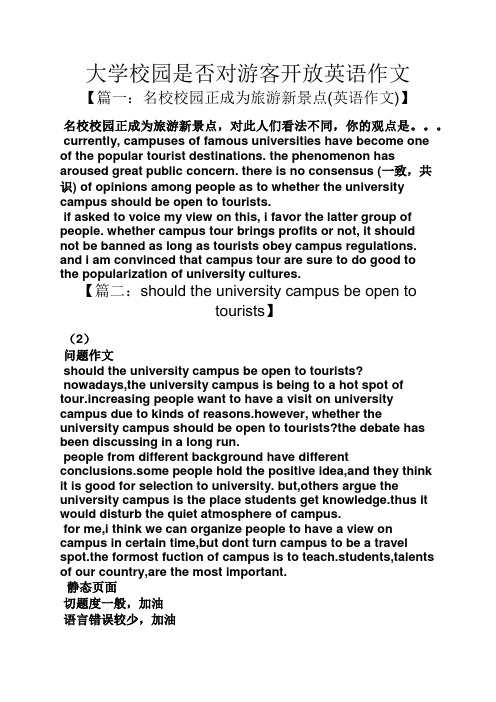
大学校园是否对游客开放英语作文【篇一:名校校园正成为旅游新景点(英语作文)】名校校园正成为旅游新景点,对此人们看法不同,你的观点是。
currently, campuses of famous universities have become oneof the popular tourist destinations. the phenomenon has aroused great public concern. there is no consensus (一致,共识) of opinions among people as to whether the university campus should be open to tourists.if asked to voice my view on this, i favor the latter group of people. whether campus tour brings profits or not, it shouldnot be banned as long as tourists obey campus regulations.and i am convinced that campus tour are sure to do good tothe popularization of university cultures.【篇二:should the university campus be open totourists】(2)问题作文should the university campus be open to tourists?nowadays,the university campus is being to a hot spot oftour.increasing people want to have a visit on university campus due to kinds of reasons.however, whether the university campus should be open to tourists?the debate has been discussing in a long run.people from different background have differentconclusions.some people hold the positive idea,and they think it is good for selection to university. but,others argue the university campus is the place students get knowledge.thus it would disturb the quiet atmosphere of campus.for me,i think we can organize people to have a view on campus in certain time,but dont turn campus to be a travel spot.the formost fuction of campus is to teach.students,talents of our country,are the most important.静态页面切题度一般,加油语言错误较少,加油题目要求:录入内容1. 名校校园正成为旅游新热点2. 校园是否应对游客开放,人们看法不同3. 我认为…作文批改建议should the university campus be open to tourists?第一段:①nowadays,the university campus is being to a hot spot of tour.首先,大学校园是泛指概念,而不是特指概念,所以,theuniversity campus不用the,而且要用复数形式,university campuses 。
【大学英语作文】学校是否应该对游客开放

已重新整理排版,欢迎下载支持【关键字】大学英语作文学校是否应该对游客开放Nowadays (recently/these days/currently), there has been a heated discussion (a sensational debate) on the issue of sth.( on whether or not we should …) People who prefer (to treat college as destination of tourists)have their reasons: The first reason for their choice is, they maintain, that (this will provide university an extra sum of money, will can help solve the university financial problem). Besides, (this practice), they go on to point out, (can help college students have contact with the outside world). What is more important,. they also claim that colleges can be soils for teenage tourists to cultivate their love for knowledge and truth.But others may not agree. They would argue that (this will inevitably distract college students from their study);What is worse, they emphasize, (tourists might leave some rubbish on the campus, which will ruin the beauty of campus).Who is right? Of course both sides have their reasons. Were I to offer my choice, I would not hesitate a moment to say that I favor (the former side). After all, (colleges and universities are public places as long as tourists take care not to cause trouble for colleges).文档从互联网中收集,已重新整理排版,word版本支持修改!1。
大学该不该开放校园英语作文 范文模板
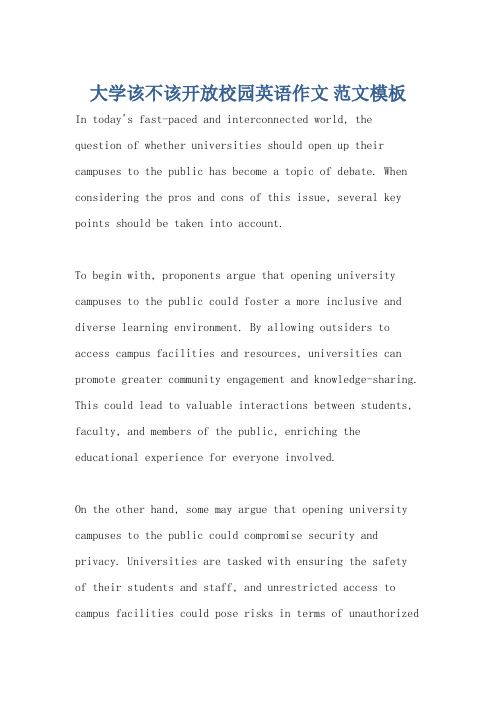
大学该不该开放校园英语作文范文模板In today's fast-paced and interconnected world, the question of whether universities should open up their campuses to the public has become a topic of debate. When considering the pros and cons of this issue, several key points should be taken into account.To begin with, proponents argue that opening university campuses to the public could foster a more inclusive and diverse learning environment. By allowing outsiders to access campus facilities and resources, universities can promote greater community engagement and knowledge-sharing. This could lead to valuable interactions between students, faculty, and members of the public, enriching the educational experience for everyone involved.On the other hand, some may argue that opening university campuses to the public could compromise security and privacy. Universities are tasked with ensuring the safety of their students and staff, and unrestricted access to campus facilities could pose risks in terms of unauthorizedentry or potential disruptions. Moreover, maintaining a balance between openness and security could prove challenging, raising concerns about how to effectively manage external visitors while protecting the university community.Additionally, there are financial considerations to takeinto account. Opening university campuses to the public may require additional resources for security, maintenance, and other related costs. Universities must weigh the potential benefits of increased access against the financial implications of accommodating external visitors.In conclusion, the question of whether universities should open their campuses to the public is a complex issue that requires careful consideration of various factors. While greater openness could promote community engagement and knowledge exchange, concerns about security, privacy, and financial sustainability must also be addressed. Ultimately, universities must strike a balance between fostering inclusivity and safeguarding the well-being of their students and staff.。
大学校园是否对外开放英语作文
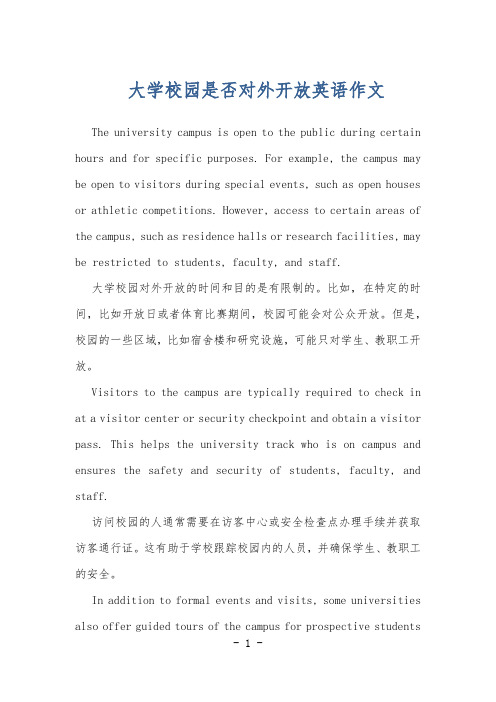
大学校园是否对外开放英语作文The university campus is open to the public during certain hours and for specific purposes. For example, the campus may be open to visitors during special events, such as open houses or athletic competitions. However, access to certain areas of the campus, such as residence halls or research facilities, may be restricted to students, faculty, and staff.大学校园对外开放的时间和目的是有限制的。
比如,在特定的时间,比如开放日或者体育比赛期间,校园可能会对公众开放。
但是,校园的一些区域,比如宿舍楼和研究设施,可能只对学生、教职工开放。
Visitors to the campus are typically required to check in at a visitor center or security checkpoint and obtain a visitor pass. This helps the university track who is on campus and ensures the safety and security of students, faculty, and staff.访问校园的人通常需要在访客中心或安全检查点办理手续并获取访客通行证。
这有助于学校跟踪校园内的人员,并确保学生、教职工的安全。
In addition to formal events and visits, some universities also offer guided tours of the campus for prospective studentsand their families. These tours are typically led by current students and provide an opportunity to learn more about the university's facilities, programs, and campus life.除了正式的活动和参观,一些大学还为有意向的学生和家长提供校园导览。
学校是否应该对游客开放_英语四级作文
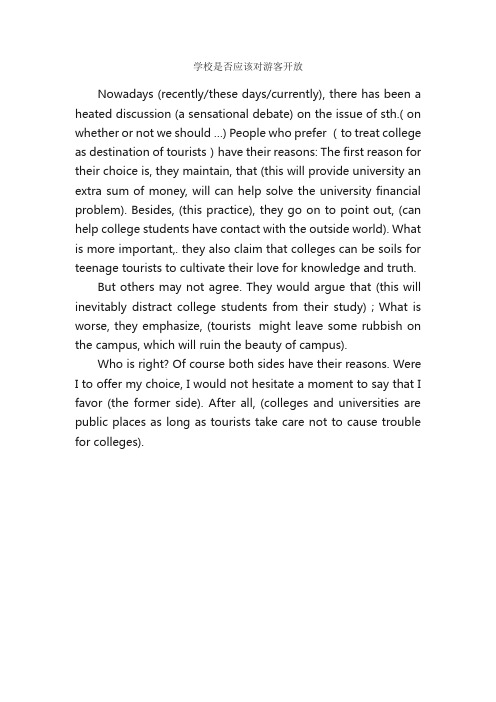
学校是否应该对游客开放Nowadays (recently/these days/currently), there has been a heated discussion (a sensational debate) on the issue of sth.( on whether or not we should …) People who prefer (to treat college as destination of tourists)have their reasons: The first reason for their choice is, they maintain, that (this will provide university an extra sum of money, will can help solve the university financial problem). Besides, (this practice), they go on to point out, (can help college students have contact with the outside world). What is more important,. they also claim that colleges can be soils for teenage tourists to cultivate their love for knowledge and truth.But others may not agree. They would argue that (this will inevitably distract college students from their study);What is worse, they emphasize, (tourists might leave some rubbish on the campus, which will ruin the beauty of campus).Who is right? Of course both sides have their reasons. Were I to offer my choice, I would not hesitate a moment to say that I favor (the former side). After all, (colleges and universities are public places as long as tourists take care not to cause trouble for colleges).。
大学是否应该开放旅游英语作文

The Controversy of University Tourism:Should Universities Welcome Visitors?The debate on whether universities should open their doors to tourists has been a hot topic for discussion in recent years. On one hand, universities are institutions of higher learning and research, and their primary function is to provide education and training. On the other hand, the unique architectural designs, lush green campuses, and historical significance of many universities make them attractive tourist destinations. The question then arises: should universities embrace tourism or maintain their exclusivity as academic havens?**The Pros of University Tourism**Firstly, opening universities to tourists can generate revenue for the institution. With the influx of visitors, universities can earn from ticket sales, souvenir sales, and even rental of facilities for events. This additional income can be used to improve facilities, enhance research, or provide scholarships for deserving students.Secondly, university tourism can promote cultural exchange and understanding. Visitors from diverse backgrounds and cultures can gain insights into the academic life, values, and traditions of the university. Such exchanges can foster a more inclusive and tolerant society.Moreover, universities are often historical landmarksin their respective cities or countries. By opening their doors to tourists, universities can contribute to the preservation of historical and cultural heritage, whilealso providing a unique educational experience for visitors. **The Cons of University Tourism**However, the arguments in favor of university tourism must be balanced against its potential downsides. Firstly, the influx of tourists can disrupt the academic environment of the university. Large crowds of visitors can interfere with classes, research, and daily life on campus, affecting the learning and working experiences of students and faculty.Secondly, the commercialization of the university environment can erode its academic values. With thepresence of souvenir shops, restaurants, and other tourist amenities, the campus may lose its focus on education and research, instead becoming a commercialized attraction.Moreover, the opening of universities to tourists can pose security risks. Large crowds can be difficult to manage, and there is always the potential for accidents or incidents that could harm both visitors and university personnel.**A Balanced Approach**Given the pros and cons of university tourism, a balanced approach is necessary. Universities should carefully consider the potential impacts of tourism ontheir academic environment and culture before deciding to open their doors to visitors. If they choose to do so, they should implement strict guidelines and regulations to ensure that the tourism activities do not interfere with academic activities.For example, universities can limit the number of visitors allowed on campus at any given time, and restrict their access to certain areas. They can also schedule special tours during non-academic hours, such as weekendsor holidays, to minimize interference with classes and research.Additionally, universities can collaborate with local tourism organizations to promote sustainable tourism practices that respect the academic environment and culture of the institution. This could include providingeducational tours that highlight the historical andcultural significance of the university, while also promoting responsible behavior among visitors.In conclusion, while university tourism has thepotential to generate revenue and promote cultural exchange, it must be carefully managed to ensure that it does not erode the academic values and environment of theinstitution. By taking a balanced approach and implementing effective guidelines and regulations, universities can welcome visitors while maintaining their primary functionas centers of higher learning and research.**大学旅游之争:大学是否应该欢迎游客?**近年来,大学是否应该向游客开放的问题成为了热议的焦点。
大学校园是否对外开放英语作文

大学校园是否对外开放英语作文English:It depends on the university's policies and regulations. Some universities have open campuses where visitors are allowed to walk around freely, while others have restricted access and require visitors to show identification or be accompanied by a student or staff member. Open campuses may have public spaces such as libraries, coffee shops, and sports facilities that are open to the public, while restricted campuses may limit access to specific areas such as student dormitories or classrooms. The decision to open or restrict access to the campus is often driven by concerns for safety and security, as well as preserving the academic environment for students and faculty. Overall, whether a university campus is open or closed to the public varies depending on the institution and its specific policies.中文翻译:这取决于大学的政策和规定。
关于大学是否开放校园旅游英语作文

S h o u l d t h e u n i v e r s i t y b e o p e n e d t o t o u r i s t As we know,when we have free time,some people will choice to travel.As time goes on,some famous university become hot tourist spot.Anthing has two sides.Should the university be opened to torist has advantage and diaadvantage.To began with,campus tour can bring economic benefit.What’s more,we can communicate with different people.Finally, this approach can make many parents and students to know about the college and improve school reputation . But some people think that should not let the campus has become a tourist attractions.Because many strangers enter into campus which brings security problems.It will produce garbage influence campus environment.As for me,the kind of phenomenon advantage outweigh its disadvantage.If we chose the vacation opening campus cann’t only to let more people know about college and solved the problem.[学习提示] 易混词汇: choice, alternative, preference, option, selection, election 均含有“选择”之意。
名校开放旅游英文作文

名校开放旅游英文作文I recently visited a prestigious school for an open tour. The campus was stunning, with beautiful buildings and well-kept grounds. I was impressed by the academic facilities, including state-of-the-art laboratories and a well-stocked library. The campus also had a vibrant atmosphere, with students engaged in various activities and clubs.The tour guide was knowledgeable and enthusiastic, providing interesting insights into the school's history and traditions. I learned about the school's strong focus on academic excellence and the wide range ofextracurricular opportunities available to students. It was clear that the school values a well-rounded education and encourages students to pursue their passions.One of the highlights of the tour was the chance to sit in on a class. I was impressed by the level of student engagement and the quality of teaching. The students werearticulate and confident, and the teacher was clearly passionate about the subject. It was inspiring to see such a dynamic learning environment.The school's commitment to community service was also evident during the tour. I learned about the various outreach programs and volunteer opportunities available to students. It was heartwarming to see how the school encourages students to make a positive impact on the world around them.Overall, the open tour left me with a deep appreciation for the school's commitment to academic excellence, student engagement, and community service. I can see why it is considered a top-tier institution, and I would highly recommend it to anyone seeking a well-rounded and enriching education.。
- 1、下载文档前请自行甄别文档内容的完整性,平台不提供额外的编辑、内容补充、找答案等附加服务。
- 2、"仅部分预览"的文档,不可在线预览部分如存在完整性等问题,可反馈申请退款(可完整预览的文档不适用该条件!)。
- 3、如文档侵犯您的权益,请联系客服反馈,我们会尽快为您处理(人工客服工作时间:9:00-18:30)。
Should the university be opened to tourist
As we know,when we have free time,some people will choice to travel.As time goes on,some famous university become hot tourist spot.
Anthing has two sides.Should the university be opened to torist has advantage and diaadvantage.To began with,campus tour can bring economic benefit.What’s more,we can communicate with different people.Finally,this approach can make many parents and students to know about the college and improve school reputation .But some people think that should not let the campus has become a tourist attractions.Because many strangers enter into campus which brings security problems.It will produce garbage influence campus environment.
As for me,the kind of phenomenon advantage outweigh its disadvantage.If we chose the vacation opening campus cann’t only to let more people know about college and solved the problem.
•[学习提示] 易混词汇: choice, alternative, preference, option, selection, election 均含有“选择”之意。
: 侧重指自由选择的权利或特权。
: 指在相互排斥的两者之间作严格的选择,也可指在两者以上中进行选择。
: 侧重因偏见、爱好或判断等而进行选择。
: 着重特别给予的选择权利或权力,所选物常常相互排斥。
: 指作广泛的选择,着重选择者的识别力或鉴赏力。
: 强调目的和达到目的判断能力。
